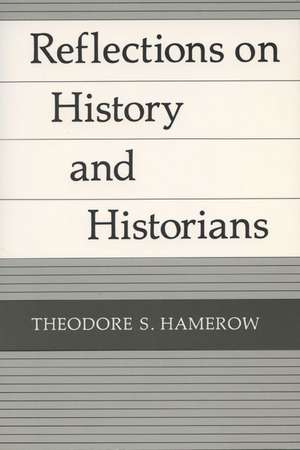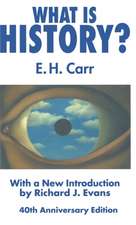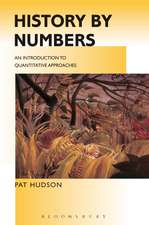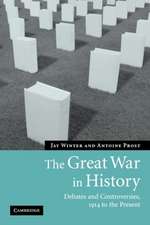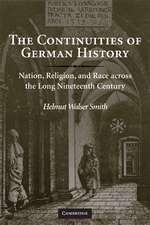Reflections on History and Historians
Autor Theodore S. Hamerowen Limba Engleză Paperback – 14 dec 1990
History as a field of learning is in a state of crisis. It has lost much of its influence in institutions of higher learning and its place in public esteem. Historians have, in large part, lost touch with the intelligent lay reader and with the undergraduate college student. History’s value to society is being questioned. In this work, a distinguished historian views the profession to which he has been devoted for more than thirty years. Theodore S. Hamerow’s learned observations will be welcomed by all historians and by those involved in the management of higher education, and should be required reading for all graduate students in history.
Far from being a sentimental look at the past, Hamerow’s work confronts the unpleasant reality of the present. History, he says flatly, is a discipline in retreat. The profession is in serious trouble and there are no signs that its problems will be resolved in the foreseeable future.
After identifying the current crisis, Hamerow proceeds to trace the development of the profession over the last hundred years and to examine its characteristics in modern society. In this section of the book he shares some fascinating practical observations on the ways in which the profession operates. Hamerow explains why some historians rise to prominence while others do not. He also examines causes of the dissatisfactions that afflict many historians and their students.
Hamerow also examines the way in which academic historians live their lives, as he expands on the daily realities that they face. He then explains how those realities have shaped scholarship and led to the “new history.” The broad use of social science methods, he observes, has had the effect of isolating the new historians from traditional historians, indeed from one another. Couched in the arcane prose of machine-readable languages, says Hamerow, history has become inaccessible to the intelligent lay reader who had once read historical works with interest, understanding, and appreciation.
In concluding his examination, Hamerow asks, “What is the use of history?” It has long been a favorite question asked by historians, but seldom one over which they agonized for very long. After considering various arguments for the usefulness of historical investigation, Hamerow offers his own justification.
There are times, says Hamerow, when even the most spontaneous or instructive cultural pursuits need to be examined in the light of the purposes they serve and the goals they seek. Now might be a good time for all historians to take a long look at the direction their discipline has taken in the past century, at the functions it has come to perform, and at the serious dilemma it now faces. Hamerow is a steady and helpful guide to any such examination.
Far from being a sentimental look at the past, Hamerow’s work confronts the unpleasant reality of the present. History, he says flatly, is a discipline in retreat. The profession is in serious trouble and there are no signs that its problems will be resolved in the foreseeable future.
After identifying the current crisis, Hamerow proceeds to trace the development of the profession over the last hundred years and to examine its characteristics in modern society. In this section of the book he shares some fascinating practical observations on the ways in which the profession operates. Hamerow explains why some historians rise to prominence while others do not. He also examines causes of the dissatisfactions that afflict many historians and their students.
Hamerow also examines the way in which academic historians live their lives, as he expands on the daily realities that they face. He then explains how those realities have shaped scholarship and led to the “new history.” The broad use of social science methods, he observes, has had the effect of isolating the new historians from traditional historians, indeed from one another. Couched in the arcane prose of machine-readable languages, says Hamerow, history has become inaccessible to the intelligent lay reader who had once read historical works with interest, understanding, and appreciation.
In concluding his examination, Hamerow asks, “What is the use of history?” It has long been a favorite question asked by historians, but seldom one over which they agonized for very long. After considering various arguments for the usefulness of historical investigation, Hamerow offers his own justification.
There are times, says Hamerow, when even the most spontaneous or instructive cultural pursuits need to be examined in the light of the purposes they serve and the goals they seek. Now might be a good time for all historians to take a long look at the direction their discipline has taken in the past century, at the functions it has come to perform, and at the serious dilemma it now faces. Hamerow is a steady and helpful guide to any such examination.
Preț: 178.72 lei
Nou
Puncte Express: 268
Preț estimativ în valută:
34.20€ • 35.80$ • 28.46£
34.20€ • 35.80$ • 28.46£
Carte tipărită la comandă
Livrare economică 31 martie-14 aprilie
Preluare comenzi: 021 569.72.76
Specificații
ISBN-13: 9780299109349
ISBN-10: 0299109348
Pagini: 288
Dimensiuni: 152 x 229 x 18 mm
Greutate: 0.4 kg
Ediția:Revised
Editura: University of Wisconsin Press
Colecția University of Wisconsin Press
ISBN-10: 0299109348
Pagini: 288
Dimensiuni: 152 x 229 x 18 mm
Greutate: 0.4 kg
Ediția:Revised
Editura: University of Wisconsin Press
Colecția University of Wisconsin Press
Recenzii
“In his fascinating, thoughtful, and deeply disturbing book, Mr. Hamerow, a professor of history at the University of Wisconsin, examines the historian’s social origins, his training, his rate of production, his self-esteem, his values, his satisfaction with his profession, the way he gets promoted, raises grants and regards his duties. . . . Mr. Hamerow paints a picture of academics so addicted to the professional rat race that they have long forgotten the true purpose of a university—teaching at the frontiers of knowledge.”—New York Times Book Review
“Publishers—even respectable university presses—are by nature inclined to make extravagant claims for their works. But in this case the jacket copy which declares that Reflections on History and Historians should be ‘required reading for all graduate students in history’ is entirely reasonable. What is more, unlike most mandatory assignments, it would probably be enjoyed.”—Reviews in American History
“His is a thought-provoking and poignant book, written in a reflective and even elegiac vein. It will send shudders—but some laughter too—through the most hardened veteran, inured to periodic bouts of collegial soul-searching.”—The American Historical Review
Notă biografică
Theodore S. Hamerow received his Ph.D. at Yale University in 1951 and has taught at the University of Wisconsin–Madison since 1958. He is renowned for his work on Central European history, especially of the nineteenth century. He is the author of numerous articles and is the author, co-author, of editor of eight other books, including Restoration, Revolution, Reaction: Economics and Politics in Germany in 1815-1871 (Princeton University Press, 1958), The Social Foundations of German Unification, 1858-1871 (Princeton University Press, 1969), and The Birth of a New Europe: State and Society in the Nineteenth Century (University of North Carolina Press, 1983).
Descriere
History as a field of learning is in a state of crisis. It has lost much of its influence in institutions of higher learning and its place in public esteem. Historians have, in large part, lost touch with the intelligent lay reader and with the undergraduate college student. History’s value to society is being questioned. In this work, a distinguished historian views the profession to which he has been devoted for more than thirty years. Theodore S. Hamerow’s learned observations will be welcomed by all historians and by those involved in the management of higher education, and should be required reading for all graduate students in history.
Far from being a sentimental look at the past, Hamerow’s work confronts the unpleasant reality of the present. History, he says flatly, is a discipline in retreat. The profession is in serious trouble and there are no signs that its problems will be resolved in the foreseeable future.
After identifying the current crisis, Hamerow proceeds to trace the development of the profession over the last hundred years and to examine its characteristics in modern society. In this section of the book he shares some fascinating practical observations on the ways in which the profession operates. Hamerow explains why some historians rise to prominence while others do not. He also examines causes of the dissatisfactions that afflict many historians and their students.
Hamerow also examines the way in which academic historians live their lives, as he expands on the daily realities that they face. He then explains how those realities have shaped scholarship and led to the “new history.” The broad use of social science methods, he observes, has had the effect of isolating the new historians from traditional historians, indeed from one another. Couched in the arcane prose of machine-readable languages, says Hamerow, history has become inaccessible to the intelligent lay reader who had once read historical works with interest, understanding, and appreciation.
In concluding his examination, Hamerow asks, “What is the use of history?” It has long been a favorite question asked by historians, but seldom one over which they agonized for very long. After considering various arguments for the usefulness of historical investigation, Hamerow offers his own justification.
There are times, says Hamerow, when even the most spontaneous or instructive cultural pursuits need to be examined in the light of the purposes they serve and the goals they seek. Now might be a good time for all historians to take a long look at the direction their discipline has taken in the past century, at the functions it has come to perform, and at the serious dilemma it now faces. Hamerow is a steady and helpful guide to any such examination.
Far from being a sentimental look at the past, Hamerow’s work confronts the unpleasant reality of the present. History, he says flatly, is a discipline in retreat. The profession is in serious trouble and there are no signs that its problems will be resolved in the foreseeable future.
After identifying the current crisis, Hamerow proceeds to trace the development of the profession over the last hundred years and to examine its characteristics in modern society. In this section of the book he shares some fascinating practical observations on the ways in which the profession operates. Hamerow explains why some historians rise to prominence while others do not. He also examines causes of the dissatisfactions that afflict many historians and their students.
Hamerow also examines the way in which academic historians live their lives, as he expands on the daily realities that they face. He then explains how those realities have shaped scholarship and led to the “new history.” The broad use of social science methods, he observes, has had the effect of isolating the new historians from traditional historians, indeed from one another. Couched in the arcane prose of machine-readable languages, says Hamerow, history has become inaccessible to the intelligent lay reader who had once read historical works with interest, understanding, and appreciation.
In concluding his examination, Hamerow asks, “What is the use of history?” It has long been a favorite question asked by historians, but seldom one over which they agonized for very long. After considering various arguments for the usefulness of historical investigation, Hamerow offers his own justification.
There are times, says Hamerow, when even the most spontaneous or instructive cultural pursuits need to be examined in the light of the purposes they serve and the goals they seek. Now might be a good time for all historians to take a long look at the direction their discipline has taken in the past century, at the functions it has come to perform, and at the serious dilemma it now faces. Hamerow is a steady and helpful guide to any such examination.
